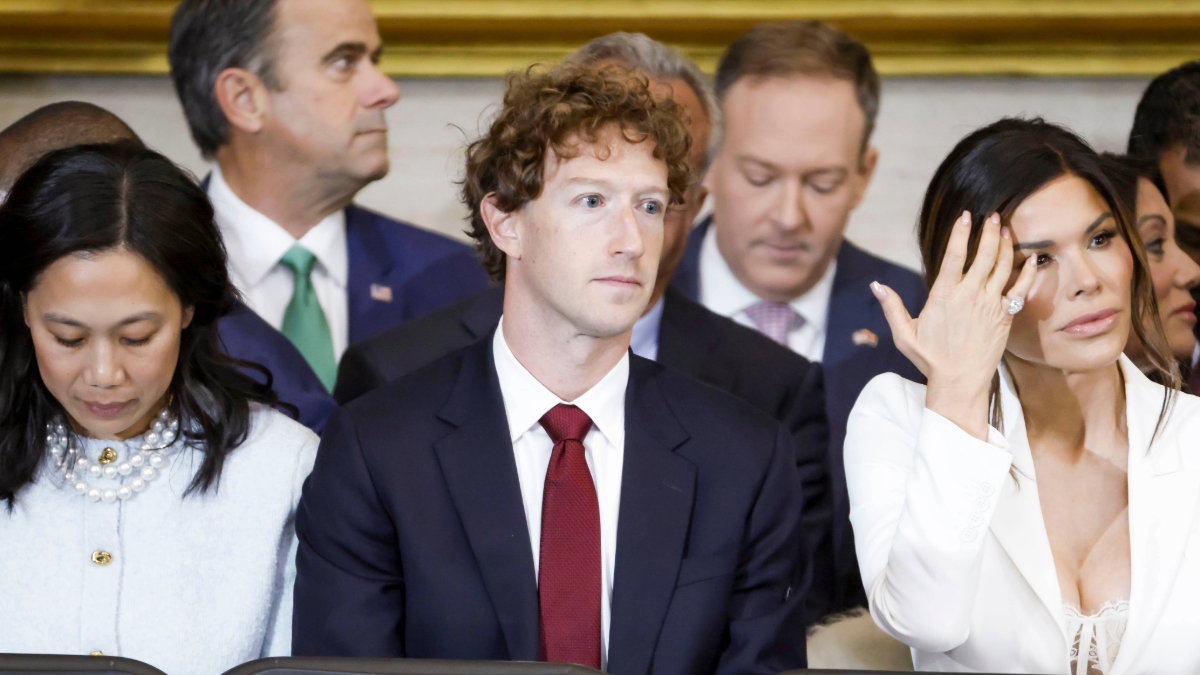Free Speech Was Never the Goal of Tech Billionaires. Power Was.
Charis Papaevangelou / Jan 22, 2025
WASHINGTON, DC - JANUARY 20, 2025: Meta CEO Mark Zuckerberg (center) at the United States Capitol to witness the inauguration of Donald Trump as the 47th President of the United States. (Photo by Shawn Thew-Pool/Getty Images)
Founder and CEO Mark Zuckerberg’s decision to dismantle Meta’s US fact-checking partnerships opens a new, troubling chapter in platform governance. Framed as a return to “free expression,” this move underscores the fragility of the fact-checking industry while laying bare the deep entanglement of tech corporations with reactionary and, frankly, fascist political agendas.
Beneath the rhetoric lies a calculated strategy: a shift toward polarization and deregulation designed to consolidate and further economic and political power. This decision reveals not only the structural flaws of fact-checking as an industry but also the extent to which state-platform capitalism–the synergy between hegemonic states and large tech corporations–is weaponizing both platform control over information flows and platform reliance on state power for survival.
Debunking Zuckerberg’s free speech claims
Let’s start with a bit of fact-checking. First, fact-checkers were never the problem. Transparency reports mandated by the EU’s Digital Services Act (DSA) reveal that fact-checked misinformation was the largest category of content demoted by Meta’s moderation systems. Yet, of the nearly 19 million fact-checked pieces of misinformation in the EU between April and September 2024, less than 0.06% were demoted manually. Meta, as we all know, overwhelmingly relies on automated systems, not fact-checkers, to moderate content. Zuckerberg’s framing of fact-checkers as agents of censorship is a red herring designed to appeal to the reactionary narratives of a ‘woke agenda.’ Ditto for Zuckerberg’s absurd claims that “restrictions on topics like immigration and gender […] are out of touch with mainstream discourse.” Sure, such rhetoric conveniently distracts from Meta’s own reliance on algorithmic systems that, while efficient, have consistently failed to address the injustices done and amplified by content moderation.
Second, fact-checking has been demonstrably effective in improving the quality of our digital information ecosystem. Studies show its success in combating health misinformation, debunking conspiracy theories, and even challenging entrenched biases. But fact-checking’s flaws, as significant as they are, are not the ones highlighted by Zuckerberg. Rather, some of the core problems concern the legitimization and funding of certain organizations. For example, CheckYourFact.com, a fact-checking partner of Meta, has faced criticism from experts for promoting climate change skepticism.
Third, a core problem of the industry lies in its structural dependency on platforms and its role–as shaped by platforms–in depoliticizing the public sphere. Many fact-checking organizations, particularly those without journalistic roots, function as what can be described as “platform-dependent complementors.” These entities provide value to platforms–by legitimizing their content moderation practices and improving the public discourse’s state–but cannot operate independently of them. This dependency extends to funding. Meta and Google have been the primary financial backers of third-party fact-checking initiatives, dictating the scope of their work and often sidelining their findings when they conflicted with platform priorities. As a result, fact-checking organizations have long walked a precarious tightrope: indispensable to the platforms they serve yet severely beholden to their whims.
Zuckerberg’s decision to sever these partnerships is bound to have a harmful impact, particularly in regions of the Global South, where misinformation poses acute dangers and where fact-checking organizations are most reliant on Meta’s support. A recent statement from an executive at the company that fact-checking will continue outside the US for now–possibly to preserve its compliance with the DSA–does little to assuage such concerns. Some entities, like Libération, saw the writing on the wall and walked away from these partnerships, while others diversified their revenue streams early. But a sudden loss of platform backing would be devastating for many, especially those in underfunded media ecosystems.
Fact-checking as a depoliticizing tool
The fact-checking industry–operating as complementary to platform ecosystems–engendered some more latent political-economic caveats, which are now becoming more visible than ever. Put simply, Meta–but also Google–essentially used fact-checking as a political instrument to fend off public scrutiny and regulation, particularly following the 2016 US Presidential Election and the COVID-19 pandemic. Otherwise, why would Facebook boast about the efficacy of its fact-checking system in tackling misinformation in its DSA-mandated transparency reports? In that sense, Zuckerberg lamenting that the Biden administration pushed Meta to allegedly “censor” unwanted content cannot be taken seriously, not because his comments were made on Joe Rogan’s podcast, but because of the political context in which they were made (i.e., with MAGA making a triumphant return) and because Meta has been demonstrably censoring non-hegemonic, or controversial content, such as pro-Palestinian voices.
Arguably, the primary objective of fact-checking was to depoliticize the public sphere as it represented a techno-solutionist approach to societal issues related to the quality of our democracies, not something that Meta or its fact-checking partners could ever meaningfully tackle. This strategy has benefited Meta because it shifted responsibility for misinformation and hate speech to these organizations while allowing the company to mitigate public criticism for handling such content and crises (e.g., Joe Biden’s infamous comment that platforms like Facebook were “killing people”). Moreover, this objective aligned with Meta’s objective to de-prioritize political content on its platforms to bolster what it called a “creator economy.”
State-platform capitalism
In the age of AI, regulation, and the consolidation of reactionary and autocratic political forces in core Western countries–and not simply in the usual authoritarian states–Meta’s strategic shift indicates its preference to stoke the fires of polarization and reactionism in the hope of becoming relevant again. Zuckerberg hopes to achieve this by following Musk’s approach to content governance on X while re-injecting political content into Meta’s platform recommender systems. While it’s worth debunking and unpacking Meta’s policy changes, we should take a step back and consider the broader geo-political dynamics at play.
For a long time, the mainstream discourse, especially in policy and academic circles, was that platforms were the rogue actors of our media and information ecosystems and that we needed to rein their power in to compel them to act as responsible actors in our market-driven societies. This has been vastly prevalent in the EU, where the discussion around having platforms operate according to our EU values is still going strong. Notwithstanding the validity of this approach to the excessive accumulation of power and capital in the hands of a few, mostly US and Chinese, companies, I believe that it overlooked a crucial element of the political economy of platform capitalism: platform corporations are rational, not responsible actors, in that they act according to their material interest of expanding their profit-seeking activities and means.
In the current political-economic climate, characterized by strong capitalist competition for the ‘next big thing’ and increased regulatory scrutiny, tech billionaires turn to state power to protect them. In a recent article, Steve Rolf and Seth Schindler proposed the concept of state-platform capitalism, whereby very large platform companies are in cahoots with state actors of core and hegemonic countries like the US in exchange for extra-territorial protection. This is exactly what we see now, both with Musk and Zuckerberg. Tech oligarchs frame public regulation, like the EU’s new digital playbook, not simply as hostile to their businesses but as hostile to US interests, aligning themselves to Trump’s “America First” agenda.
This framing, in addition to the tech billionaire’s pilgrimage and courting of the incoming fascist administration, is key to extending their political-economic objectives and benefit from the US state’s protection. In fact, this strategy might already present some benefits for Big Tech as Brussels is reportedly reevaluating its approach to investigations against Big Tech companies that were recently opened in the EU.
A need for a progressive counterproposal
Today, the synergy between fascism and (technological) capital is more evident than ever. As my colleague João C. Magalhāes wrote, Zuckerberg’s brief but already historic video is an apology–not to those unjustly harmed by content moderation mechanisms–but to Trump, his supporters, and their ideological allies worldwide. It is both an apology and an invitation to an alliance against what Zuckerberg describes as forces attacking American companies and the specter of the “woke agenda” they have fabricated themselves.
Seen this way, it’s clear as day that the far-right has been successfully politicizing the discourse around platform governance, weaponizing terms like “free speech” to undermine regulatory efforts and consolidate their influence. Meanwhile, progressive and left-leaning voices have too often relied on technocratic solutions, treating regulation as the sole means of addressing corporate power. This approach is no longer sufficient.
As a result, like-minded experts, pundits, policymakers, activists, and others should metabolize their frustration with Zuckerberg (or Musk or Bezos) and turn it to identifying the structural cause–unfettered, profit-seeking capitalism–and start politicizing the discussion with earnest and deeper democratic counter-proposals. In the meantime, we should be maintaining and increasing the pressure on public actors to tackle corporate power, as the EU has been doing in recent years (though with Margrethe Vestager’s exit and the hegemonic grip that Mario Draghi’s report seems to be taking on the Commission’s leaders, we might see a shift in the previous firmer approach).
For those concerned about the future of democracy, the quality of the public sphere, and the rights to safety, dignity, and respect, this moment demands intensifying the political discourse and fostering a deeply democratic and progressive counter-vision. The gloves are now off, and to counter the growing interplay between platform capitalism, state authoritarianism, and increasingly fascist qualities, we must (re-)politicize the conversation. We must be bold in our endeavors lest we prefer to leave more space to reactionary forces.
Corrections: A previous version of this article mistakenly attributed a critical characterization to Science Feedback instead of CheckYourFact.com. This has been corrected. Additionally, the same paragraph included a critical claim regarding Ellinika Hoaxes, which has been removed following a discussion with the organization that clarified its practices.
Authors
